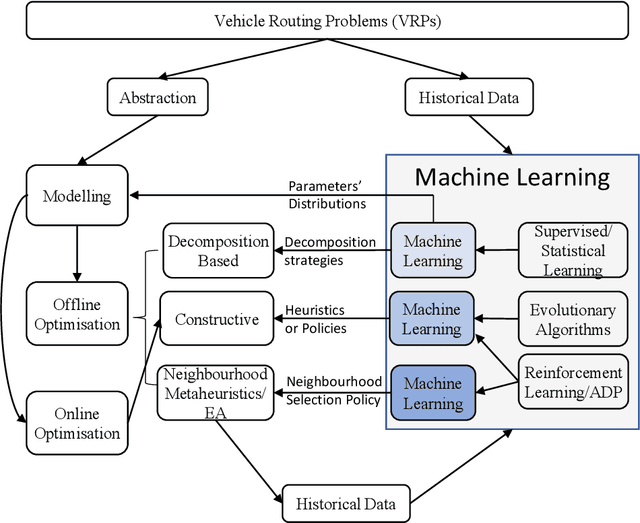Zhi-Long Chen
Integrated Offline and Online Learning to Solve a Large Class of Scheduling Problems
Jan 08, 2025Abstract:In this paper, we develop a unified machine learning (ML) approach to predict high-quality solutions for single-machine scheduling problems with a non-decreasing min-sum objective function with or without release times. Our ML approach is novel in three major aspects. First, our approach is developed for the entire class of the aforementioned problems. To achieve this, we exploit the fact that the entire class of the problems considered can be formulated as a time-indexed formulation in a unified manner. We develop a deep neural network (DNN) which uses the cost parameters in the time-indexed formulation as the inputs to effectively predict a continuous solution to this formulation, based on which a feasible discrete solution is easily constructed. The second novel aspect of our approach lies in how the DNN model is trained. In view of the NP-hard nature of the problems, labels (i.e., optimal solutions) are hard to generate for training. To overcome this difficulty, we generate and utilize a set of special instances, for which optimal solutions can be found with little computational effort, to train the ML model offline. The third novel idea we employ in our approach is that we develop an online single-instance learning approach to fine tune the parameters in the DNN for a given online instance, with the goal of generating an improved solution for the given instance. To this end, we develop a feasibility surrogate that approximates the objective value of a given instance as a continuous function of the outputs of the DNN, which then enables us to derive gradients and update the learnable parameters in the DNN. Numerical results show that our approach can efficiently generate high-quality solutions for a variety of single-machine scheduling min-sum problems with up to 1000 jobs.
Analytics and Machine Learning in Vehicle Routing Research
Feb 19, 2021
Abstract:The Vehicle Routing Problem (VRP) is one of the most intensively studied combinatorial optimisation problems for which numerous models and algorithms have been proposed. To tackle the complexities, uncertainties and dynamics involved in real-world VRP applications, Machine Learning (ML) methods have been used in combination with analytical approaches to enhance problem formulations and algorithmic performance across different problem solving scenarios. However, the relevant papers are scattered in several traditional research fields with very different, sometimes confusing, terminologies. This paper presents a first, comprehensive review of hybrid methods that combine analytical techniques with ML tools in addressing VRP problems. Specifically, we review the emerging research streams on ML-assisted VRP modelling and ML-assisted VRP optimisation. We conclude that ML can be beneficial in enhancing VRP modelling, and improving the performance of algorithms for both online and offline VRP optimisations. Finally, challenges and future opportunities of VRP research are discussed.
 Add to Chrome
Add to Chrome Add to Firefox
Add to Firefox Add to Edge
Add to Edge